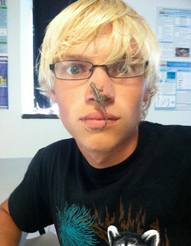Tucker Cambridge
I am broadly interested in characterizing the genetic structure of amphibian populations in order to better inform wildlife management policy and our understanding of amphibian conservation biology. Disease ecology is increasingly becoming an essential area of study in the conservation biology of amphibians, especially as the spread and virulence of generalist amphibian pathogens continues unabated on a global scale. My current research will focus on two generalist amphibian pathogens which have been responsible for mass die-offs and wide spread infections; Batrachochytrium dendrobatidis (Bd) a Chytrid fungus, and Frog virus 3 (FV3) an Iridoviridae Ranavirus. I am interested in how the prevalence of amphibian pathogens relates to the underlying genetic structure of amphibian populations and the extent to which genetic variation buffers disease virulence through genetic fitness correlations. My research will involve two main experiment types; quantification of disease presence and diversity of Major Histocompatibility Complex genotypes in wild amphibian populations, and transcriptomic gene expression analysis of experimentally inoculated amphibians in the lab. My research objectives are to determine selection mechanism acting on wild populations experiencing infection (over-dominance vs. frequency dependent selection); determine taxon, life-stage, and pathogen strain specific differences in host gene expression during infection; and identify previously unrecognized candidate genes associated with disease resistance.
|
Education |
|
Contact:
email: [email protected]
email: [email protected]
